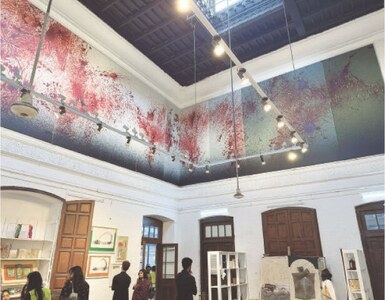
During a mundane bout of social media scrolling, I stumbled upon a post by Tanzila Khan on the popular Facebook group Soul Sisters. Khan had shared pictures of her trip to Egypt with her two friends. What was extraordinary about the post was that she and her friends were all wheelchair-bound and yet had managed to travel independently.
Their pictures made me smile, and it felt empowering to read what these women had achieved, despite the challenges they must have had to face on their travels.
At the same time, it saddened me to realise that such stories are too few and far between on mainstream media. It isn’t a stretch to say that mainstream Pakistani media leaves much to be desired in terms of representation and diversity in storytelling. On the rare occasion that one does happen to see a person with a disability or a child with special needs in a television show, film or drama, it is often no more than a one-dimensional, stereotypical portrayal.
Fatima Hasan blogs the reality of life as a differently abled young woman on Instagram. In a sea of able-bodied beauty and lifestyle influencers, Hasan’s blog is a refreshing space to explore, where she shares her daily life with a whole lot of charm and grace. Hasan lives with dystonia and dysphonia, which has significantly weakened the muscles in her body, including her vocal chords, affecting her ability to speak.
“When I started my blog, I never thought that I’d get a good response, because disability is a huge taboo in Pakistan,” says Hasan. “People don’t accept disability easily. They neglect and reject it without realising how it impacts us emotionally and physically,” she says.

Some influencers who use social media to share their challenges as differently abled persons are effectively creating awareness about diversity and inclusivity
Between posts showing off her stylish working-woman’s wardrobe, and videos of her fitness regime, Hasan also shares the challenges of living with disability. She talks openly about how negative comments affect her, as well as her mental health struggles.
Less inclusivity in mainstream media not only deprives us from witnessing tremendous stories of survival, triumph, heartbreak and resilience, it also isolates a whole community in need of support and connection.
Hassan Ahmad’s journey as Pakistan’s first-ever deaf vlogger began after he realised how there was little content online that was accessible to a deaf audience.

“When I would look at [videos of] food reviews on Facebook,” he says, “I thought about how this isn’t available to the deaf community because the videos did not have subtitles. That’s how I got the idea of making my own vlogs, so that the deaf community can also get to know about restaurants and the conversation around brands and eateries can be more inclusive,” Ahmad explains.
This is how social media has revolutionised and democratised the online landscape. It offers space for everyone to tell their story, like Hasan, and helps create more awareness of and exposure for diverse voices such as Ahmad’s. The latter has come a long way from his first vlog review of a pizzeria in Bahria Town, in his hometown of Islamabad. Today he has an active social media presence and regularly shares videos on Facebook, Instagram and YouTube for his followers.
His content has grown to include sign language re-enactments of popular dramas and videos, educational videos teaching people sign language, as well as glimpses of his everyday life. In addition to being invited to several talk shows to share his experience as a deaf vlogger, he was also asked to give a TED Talk at the International Islamic University, Islamabad.

One of the reasons that social media has become such a huge part of our lives is its power of connecting like-minded people across the world. This is something Danish Mumtaz immediately discovered when he started an Instagram account documenting his 13-year-old son Sulayman’s journey with autism.
Mumtaz posts about Sulayman’s workouts, him doing his favourite activities and his daily milestones. The father also uses this space to talk about autism and share information with other parents who have children with special needs.
Based in Malaysia, Mumtaz has been trained in the Son-Rise Programme, a home-based programme for children and adults with autism spectrum disorders. After his training, he decided to share on Instagram the strategies that helped Sulayman. He received an immediate response, and a lot of messages of acknowledgement from parents of children with special needs who sought the comfort of a community.
“Half the time, the parents who call me don’t want a diagnosis,” says Mumtaz, “they don’t want my help, they just want to talk. They just want to hear another parent saying it’s a hard situation and, like any other support system, that helps.”
Having a presence on Instagram has also positively affected Sulayman. “He knows that he has an Instagram account now,” says Mumtaz. “I used to have a huge problem trying to get him to smile. Now he knows that Baba is taking a photo and it’s going to be posted somewhere. So now when I pull out the camera, he instantly smiles at it,” explains the proud father.
Whereas Mumtaz founded a great community of dads with autistic children on Instagram, the majority of users who have connected with him have been Pakistani women, who either have a child that is autistic or suspect that their child might be on the autism spectrum.
These women also seek advice on how to get their partners more involved in their autistic child’s life.
“These women had trouble getting their husbands to be part of the treatment,” says Mumtaz, “or even part of the conversation, because they were either in denial or had given up. A lot of mothers said that they showed my posts to their husbands so they can see that it’s not all bad. And that’s what I’ve been preaching from the start. Your child is autistic, but it’s not the end of the world. If you have a healthy, living child, then that’s all that you could want.”
Through her blog, Hasan has also connected with women in Pakistan living with dystonia and dysphonia. “The best response is when people with the same disease reach out to me,” she says. “There’s a perception that dystonia isn’t common in Pakistan, but now I feel it has never been researched here, hence we lack the statistics.”
Hasan’s blog has garnered media attention around the issues of living with dystonia and dysphonia. A consistent message in many of her interviews and social media posts is for people to be empathetic, to foster an understanding of people with disabilities and acknowledge them as equal members of society.
She wants to encourage differently abled women to confidently embrace and express themselves, “Loag kya kahengey? [What will people say?] will never end, but your life will, so live it with pride,” she says. “Be confident with who you are.”
With digital technology shaping the way we live, Ahmad believes the deaf community can use social media to improve their lives. “Social media has given the deaf community a platform to express their views in their own language. These digital platforms also help them access opportunities to earn for themselves, just like the rest of society.”
He says his videos have helped create awareness in both the deaf and hearing communities. “My videos are appreciated by not just the deaf community but the broader hearing community as well, because it gives them exposure to deaf culture and the chance to learn sign language.”
For me personally, following the accounts mentioned above adds immense value to my life. These people inspire and educate me. When it comes to my offline interactions, I tend to stay in my comfort zone, spending time with a small group of family and friends. It is social media that has given me the privilege to look at the world from the perspective of people who live different lives than mine.
However, as I get a glimpse into their day-to-day lives and their unique challenges, I also realise how far we still have to go when it comes to understanding disability and special needs. The hope is that we will continue these conversations offline and ensure that inclusivity isn’t something we’ve restricted to the virtual world.
The writer is a communication officer at LUMS. She tweets @sameenmohsin
Published in Dawn, EOS, November 28th, 2021


































